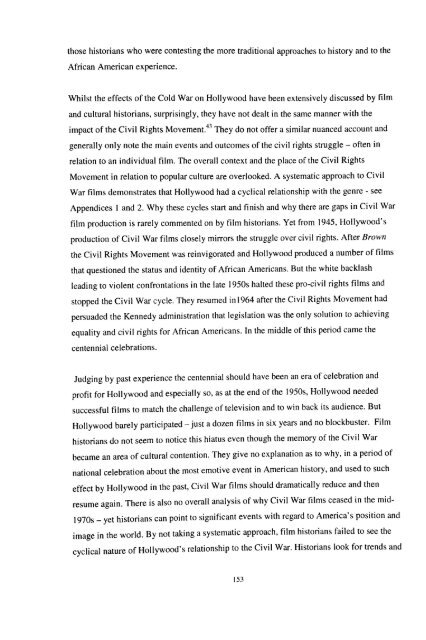Download (3483kB) - Greenwich Academic Literature Archive ...
Download (3483kB) - Greenwich Academic Literature Archive ...
Download (3483kB) - Greenwich Academic Literature Archive ...
- No tags were found...
Create successful ePaper yourself
Turn your PDF publications into a flip-book with our unique Google optimized e-Paper software.
those historians who were contesting the more traditional approaches to history and to theAfrican American experience.Whilst the effects of the Cold War on Hollywood have been extensively discussed by filmand cultural historians, surprisingly, they have not dealt in the same manner with theimpact of the Civil Rights Movement. 43 They do not offer a similar nuanced account andgenerally only note the main events and outcomes of the civil rights struggle - often inrelation to an individual film. The overall context and the place of the Civil RightsMovement in relation to popular culture are overlooked. A systematic approach to CivilWar films demonstrates that Hollywood had a cyclical relationship with the genre - seeAppendices 1 and 2. Why these cycles start and finish and why there are gaps in Civil Warfilm production is rarely commented on by film historians. Yet from 1945, Hollywood'sproduction of Civil War films closely mirrors the struggle over civil rights. After Brownthe Civil Rights Movement was reinvigorated and Hollywood produced a number of filmsthat questioned the status and identity of African Americans. But the white backlashleading to violent confrontations in the late 1950s halted these pro-civil rights films andstopped the Civil War cycle. They resumed in 1964 after the Civil Rights Movement hadpersuaded the Kennedy administration that legislation was the only solution to achievingequality and civil rights for African Americans. In the middle of this period came thecentennial celebrations.Judging by past experience the centennial should have been an era of celebration andprofit for Hollywood and especially so, as at the end of the 1950s, Hollywood neededsuccessful films to match the challenge of television and to win back its audience. ButHollywood barely participated -just a dozen films in six years and no blockbuster. Filmhistorians do not seem to notice this hiatus even though the memory of the Civil Warbecame an area of cultural contention. They give no explanation as to why, in a period ofnational celebration about the most emotive event in American history, and used to sucheffect by Hollywood in the past, Civil War films should dramatically reduce and thenresume again. There is also no overall analysis of why Civil War films ceased in the mid-1970s - yet historians can point to significant events with regard to America's position andimage in the world. By not taking a systematic approach, film historians failed to see thecyclical nature of Hollywood's relationship to the Civil War. Historians look for trends and153
















